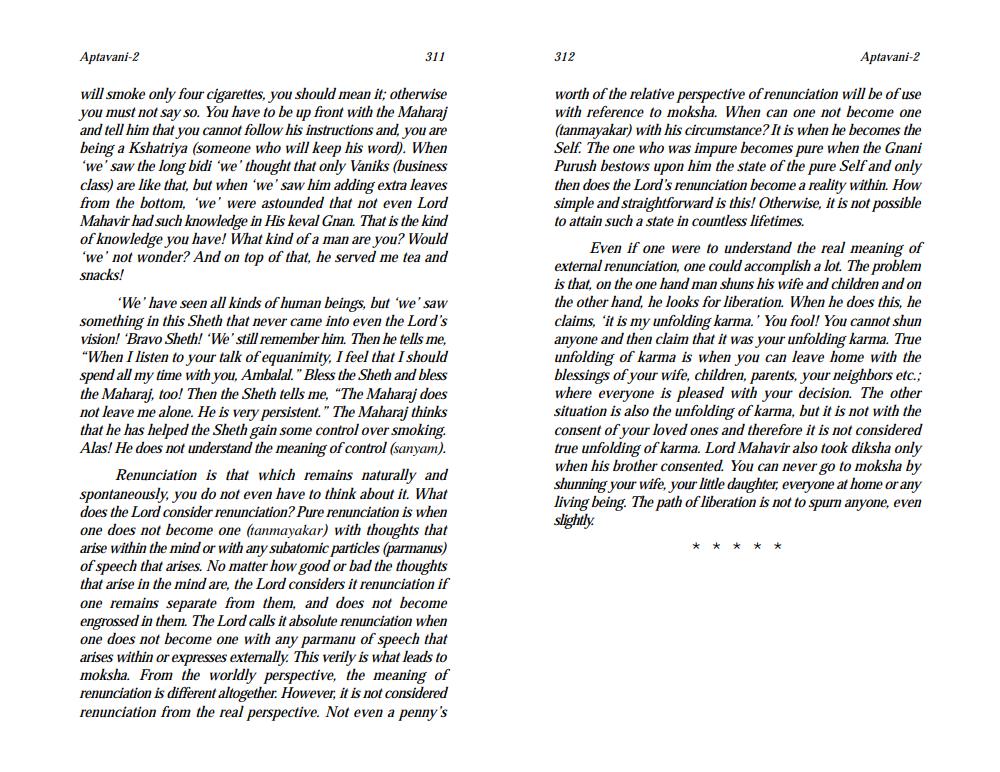________________
Aptavani-2
311
will smoke only four cigarettes, you should mean it; otherwise you must not say so. You have to be up front with the Maharaj and tell him that you cannot follow his instructions and, you are being a Kshatriya (someone who will keep his word). When 'we' saw the long bidi 'we' thought that only Vaniks (business class) are like that, but when 'we' saw him adding extra leaves from the bottom, 'we' were astounded that not even Lord Mahavir had such knowledge in His keval Gnan. That is the kind of knowledge you have! What kind of a man are you? Would 'we' not wonder? And on top of that, he served me tea and snacks!
'We' have seen all kinds of human beings, but 'we' saw something in this Sheth that never came into even the Lord's vision! 'Bravo Sheth! 'We' still remember him. Then he tells me, "When I listen to your talk of equanimity, I feel that I should spend all my time with you, Ambalal." Bless the Sheth and bless the Maharaj, too! Then the Sheth tells me, "The Maharaj does not leave me alone. He is very persistent." The Maharaj thinks that he has helped the Sheth gain some control over smoking. Alas! He does not understand the meaning of control (sanyam).
Renunciation is that which remains naturally and spontaneously, you do not even have to think about it. What does the Lord consider renunciation? Pure renunciation is when one does not become one (tanmayakar) with thoughts that arise within the mind or with any subatomic particles (parmanus) of speech that arises. No matter how good or bad the thoughts that arise in the mind are, the Lord considers it renunciation if one remains separate from them, and does not become engrossed in them. The Lord calls it absolute renunciation when one does not become one with any parmanu of speech that arises within or expresses externally. This verily is what leads to moksha. From the worldly perspective, the meaning of renunciation is different altogether. However, it is not considered renunciation from the real perspective. Not even a penny's
312
Aptavani-2
worth of the relative perspective of renunciation will be of use with reference to moksha. When can one not become one (tanmayakar) with his circumstance? It is when he becomes the Self. The one who was impure becomes pure when the Gnani Purush bestows upon him the state of the pure Self and only then does the Lord's renunciation become a reality within. How simple and straightforward is this! Otherwise, it is not possible to attain such a state in countless lifetimes.
Even if one were to understand the real meaning of external renunciation, one could accomplish a lot. The problem is that, on the one hand man shuns his wife and children and on the other hand, he looks for liberation. When he does this, he claims, 'it is my unfolding karma.' You fool! You cannot shun anyone and then claim that it was your unfolding karma. True unfolding of karma is when you can leave home with the blessings of your wife, children, parents, your neighbors etc.; where everyone is pleased with your decision. The other situation is also the unfolding of karma, but it is not with the consent of your loved ones and therefore it is not considered true unfolding of karma. Lord Mahavir also took diksha only when his brother consented. You can never go to moksha by shunning your wife, your little daughter, everyone at home or any living being. The path of liberation is not to spurn anyone, even slightly.




